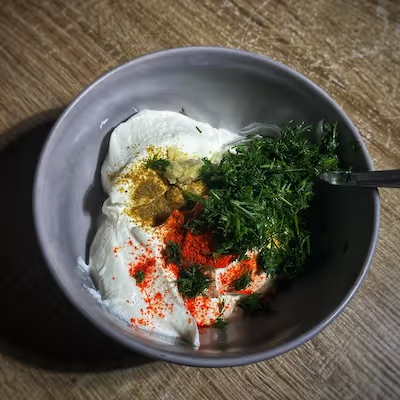Perfect Turkish Eggs
Learn how to make delicious Turkish eggs (çılbır) in just 30 minutes with poached eggs, spiced yogurt, and za'atar. Perfect for a quick and flavorful breakfast!
Servings
Prep Time
Cook Time
Ingredients
Total Time
Ingredients
Yogurt Sauce
- 300 g Greek yogurt
- 1 tsp cumin
- 1 tsp paprika
- 1 garlic clove, grated
- 1 cup fresh dill, finely chopped
- 1 tbsp olive oil
- Salt to taste
Spicy Butter
- 30 g butter
- 1 tsp smoked paprika
- 1 tsp hot paprika (adjust to taste)
Za'atar Sauce
- 2 tbsp za'atar
- 3 tbsp olive oil
Poached Eggs
- 2-4 eggs
- 1 liter water
- 1 tbsp salt
Equipment
- Mixing bowl
- Grater
- Small saucepan
- Pot or wok
- Spoon
- Serving plates
Instructions
I don't know about you, but one of the best things about weekends for us is the chance to indulge in a more sophisticated breakfast. During the busy workweek, breakfast might consist of nothing more than yogurt or maybe just a cup of black coffee.
But when the weekend rolls around, there's time to create something special. And one of our all time favorite breakast/brunch recipes is Turkish eggs — or çılbır — a simple yet flavorful dish. Even better? It takes less than 30 minutes to make. So here it goes.
How to Make Turkish Eggs
- Prepare the yogurt sauce: Mix the yogurt with cumin, paprika, garlic, chopped dill, olive oil, and salt.

- Set it aside.
- Poach the eggs: Heat water and salt in a pot (or wok) until it boils.

- Remove from heat and carefully add your eggs, poaching them for 3-4 minutes.
- Make the spicy butter: Melt the butter on medium heat, add smoked and hot paprika, and stir. Remove from heat.
- Prepare the za'atar sauce: Combine za'atar and olive oil in a bowl.
- Assemble the dish: Divide the yogurt between plates, top with poached eggs, drizzle the spicy butter, and finish with the za'atar sauce.
Serve with pita bread or roti for dipping, and enjoy your quick, easy Turkish eggs breakfast.
What Are Turkish Eggs (Çılbır)?
Now, with the instructions out of the way, let's take a look at the history of this recipe and understand it better. So, the traditional dish of Turkish eggs, cilbir, dates back to the 15th century when it was served to the Ottoman Sultans as a royal breakfast.
The dish consists of poached eggs served on a bed of spiced yogurt and topped with a drizzle of spicy melted butter.
Years have passed, and the popularity of the recipe has grown tremendously. Today, Turkish eggs are a favorite across various Balkan countries, though some variations exist. For example, in Serbia or Montenegro, you might find this dish with fried eggs instead of poached.
However, despite regional differences, the dish remains a staple for those seeking a nutritious, flavorful breakfast.
Our Version vs. Traditional Turkish Eggs
While the core of Turkish poached eggs remains intact, we've given this Turkish eggs recipe a twist. Traditionally, the yogurt is usually plain, but in our version, we've spiced it up with cumin, paprika, garlic, and fresh dill for an extra kick.
We've also added a touch of za'atar sauce, a Middle Eastern blend of herbs mixed with olive oil, to bring even more flavor complexity to the dish.
This modernized approach to the classic Turkish eggs breakfast not only adds a unique touch but also introduces a wider range of flavors to your palate. The result? A rich, layered dish that's both satisfying and easy to prepare. Plus, it's healthier than you might think!
Nutrition Facts: Are Turkish Eggs Healthy?
Turkish eggs offer a fantastic balance of protein, healthy fats, and probiotics, especially when made with Greek yogurt.
The eggs provide high-quality protein, while the yogurt is packed with gut-friendly probiotics.
The olive oil and butter used in the dish offer healthy fats, particularly if you moderate the amount of spicy butter.
Overall, this dish is a great choice for anyone looking for a nutritious breakfast with balanced macros.
FAQs
Still have questions? Don't worry. I have more answers.
Q: Are Turkish eggs healthy?
A: Yes, Turkish eggs are a healthy option! They are rich in protein from the eggs, probiotics from the Greek yogurt, and healthy fats from the olive oil and butter. They provide a balanced meal that can support digestive and heart health.
Q: What are Turkish eggs?
A: Turkish eggs, also known as çılbır, are a traditional Ottoman dish consisting of poached eggs served over spiced yogurt, topped with melted butter. They are still popular in Turkey and the Balkans today.
Q: How to pronounce çılbır (Turkish eggs)?
A: Çılbır is pronounced as "chil-bir."
Q: How to eat Turkish eggs?
A: You can enjoy Turkish poached eggs with a side of bread, such as pita or roti, for dipping into the yogurt and egg mixture. The creamy yogurt, rich butter, and runny egg yolk make for a flavorful combination.
Q: How many calories are in Turkish eggs?
A: A serving of Turkish eggs typically contains about 300-400 calories, depending on the portion size and the amount of butter and oil used. This dish offers a great balance of fats, protein, and carbohydrates, making it a satisfying, nutrient-dense meal.
Conclusion
We hope this version of Turkish eggs (çılbır) has inspired you to bring a little bit of Ottoman tradition into your weekend breakfast routine. With its rich flavors, balanced nutrition, and ease of preparation, this dish is sure to become a favorite.
Whether you're a seasoned cook or just getting started, it's a simple yet impressive recipe that anyone can master.
Give it a try, and when you do, make sure to tag us along! We'd love to see your creations.
For a step-by-step guide, be sure to check out the full video of this recipe on YouTube. Don't forget to like the video and subscribe to our channel for more delicious and easy-to-make recipes!
Nutrition Facts / Serving
- Calories 545
- Total Fat 47 g
- Cholesterol 311 mg
- Sodium 1423 mg
- Potassium 394 mg
- Total Carbohydrate 8 g
- Sugars 5 g
- Protein 24 g




.svg)







